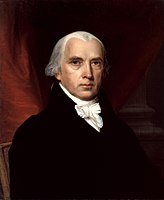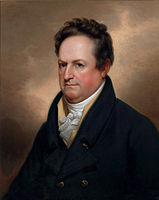
Back انتخابات الرئاسة الأمريكية 1812 Arabic Volby prezidenta USA 1812 Czech Præsidentvalget i USA 1812 Danish Präsidentschaftswahl in den Vereinigten Staaten 1812 German Elecciones presidenciales de Estados Unidos de 1812 Spanish انتخابات ریاستجمهوری ایالات متحده آمریکا (۱۸۱۲) Persian Yhdysvaltain presidentinvaalit 1812 Finnish Élection présidentielle américaine de 1812 French הבחירות לנשיאות ארצות הברית 1812 HE Elezioni presidenziali negli Stati Uniti d'America del 1812 Italian
| ||||||||||||||||||||||||||||||||
217 members of the Electoral College 109 electoral votes needed to win | ||||||||||||||||||||||||||||||||
|---|---|---|---|---|---|---|---|---|---|---|---|---|---|---|---|---|---|---|---|---|---|---|---|---|---|---|---|---|---|---|---|---|
| Turnout | 40.4%[1] | |||||||||||||||||||||||||||||||
| ||||||||||||||||||||||||||||||||
 Presidential election results map. Green denotes states won by Madison and Orange denotes states won by Clinton. Numbers indicate the number of electoral votes cast by each state. | ||||||||||||||||||||||||||||||||
| ||||||||||||||||||||||||||||||||
The 1812 United States presidential election was the seventh quadrennial presidential election. It was held from Friday, October 30, 1812, to Wednesday, December 2, 1812. Taking place in the shadow of the War of 1812, incumbent Democratic-Republican President James Madison defeated DeWitt Clinton, the Lieutenant Governor of New York and Mayor of New York City, who drew support from dissident Democratic-Republicans in the North as well as Federalists. It was the first presidential election to be held during a major war involving the United States.[2]
Northern Democratic-Republicans had long been dissatisfied by the Southern dominance of their party, and DeWitt Clinton's uncle, Vice President George Clinton, had unsuccessfully challenged Madison for the party's 1808 presidential nomination. While the May 1812 Democratic-Republican congressional nominating caucus re-nominated Madison, the party's New York caucus, also held in May, nominated Clinton for president. After the United States declared war on the United Kingdom in June 1812, Clinton sought to create a coalition of anti-war Democratic-Republicans and Federalists.[3] With Clinton in the race, the Federalist Party declined to formally put forth a nominee, hoping its members would vote for Clinton, but they did not formally endorse him, fearing that an explicit endorsement of Clinton would hurt the party's fortunes in other races. Federalist Jared Ingersoll of Pennsylvania became Clinton's de facto running mate. A dissident faction of the Federalist Party attempted to nominate former vice presidential candidate Rufus King over Clinton, but only succeeded in doing so in Virginia.
Despite Clinton's success at attracting Federalist support, Madison was re-elected with 50.4 percent of the popular vote to his opponent's 47.6%, making the 1812 election the closest election up to that point in the popular vote. Clinton won the Federalist bastion of New England as well as three Mid-Atlantic states, but Madison dominated the South and took Pennsylvania. This was the narrowest popular vote margin for a victorious re-elected president until 2004.
- ^ "National General Election VEP Turnout Rates, 1789-Present". United States Election Project. CQ Press.
- ^ Cite error: The named reference
sabato1was invoked but never defined (see the help page). - ^ Morison, Samuel Eliot (1965). The Oxford History of the American People. New York: Oxford. p. 383.
Cite error: There are <ref group=Note> tags on this page, but the references will not show without a {{reflist|group=Note}} template (see the help page).
© MMXXIII Rich X Search. We shall prevail. All rights reserved. Rich X Search

